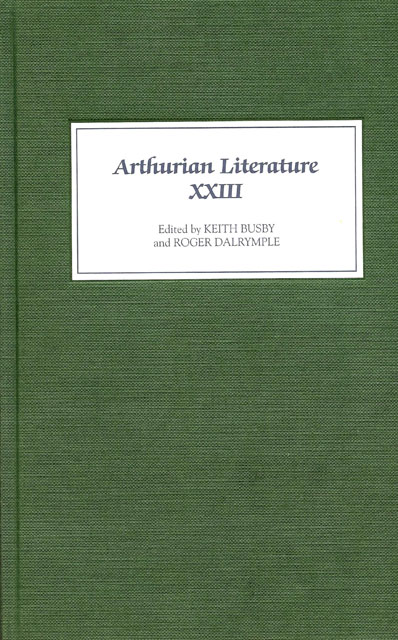Book contents
- Frontmatter
- Contents
- General Editor’s Foreword
- I Beyond Shame: Chivalric Cowardice and Arthurian Narrative
- II Malory’s Forty Knights
- III Fooling with Language: Sir Dinadan in Malory’s Morte Darthur
- IV William Caxton, Wynkyn de Worde and the Editing of Malory’s Morte Darthur
- V Ballad and Popular Romance in the Percy Folio
- VI Local Hero: Gawain and the Politics of Arthurianism
- VII Promise-postponement Device in The Awntyrs Off Arthure: a Possible Narrative Model
- VIII L’Atre perilleux and the Erasure of Identity
- IX The Theme of the Handsome Coward in the Post-Vulgate Queste del Saint Graal
- X A Time of Gifts? Jean de Nesle, William A. Nitze and The Perlesvaus
- XI Thomas Love Peacock’s The Misfortunes of Elphin and the Romantic Arthur
- Contents of Previous Volumes
IX - The Theme of the Handsome Coward in the Post-Vulgate Queste del Saint Graal
Published online by Cambridge University Press: 23 March 2023
- Frontmatter
- Contents
- General Editor’s Foreword
- I Beyond Shame: Chivalric Cowardice and Arthurian Narrative
- II Malory’s Forty Knights
- III Fooling with Language: Sir Dinadan in Malory’s Morte Darthur
- IV William Caxton, Wynkyn de Worde and the Editing of Malory’s Morte Darthur
- V Ballad and Popular Romance in the Percy Folio
- VI Local Hero: Gawain and the Politics of Arthurianism
- VII Promise-postponement Device in The Awntyrs Off Arthure: a Possible Narrative Model
- VIII L’Atre perilleux and the Erasure of Identity
- IX The Theme of the Handsome Coward in the Post-Vulgate Queste del Saint Graal
- X A Time of Gifts? Jean de Nesle, William A. Nitze and The Perlesvaus
- XI Thomas Love Peacock’s The Misfortunes of Elphin and the Romantic Arthur
- Contents of Previous Volumes
Summary
The Post-Vulgate Queste del Saint Graal, which together with the Post-Vulgate version of the Mort Artu forms the third part of the Post-Vulgate Roman du Graal, was composed between 1230 and 1240, that is, shortly after the Vulgate Cycle of Arthurian romances and the First Version of the prose Tristan (Tr. I) but before the Second Version of the prose Tristan (Tr. II) and the Palamède. Unlike the Vulgate Cycle, the Post-Vulgate has not been preserved in its original French form in any one manuscript, but it has been possible to reconstruct the narrative with the aid of the Portuguese and Spanish translations, the Demanda do Santo Graal and the Demanda del Sancto Grial, from various fragments, including those preserved in manuscripts of the Second Version of the prose Tristan. For through good fortune shortly after its composition, the Post-Vulgate was not only translated first into Portuguese and then from the Portuguese into Spanish, but large portions of the Queste were incorporated into the Second Version of the prose Tristan.
Although in the middle section of the Post-Vulgate Roman du Graal, the so-called Suite du Merlin, the young knight Baudemagus refers to himself as biaus et mauvais when King Pellinor choses Tor and not him to occupy one of the seats at the Round Table that had become vacant on the death of eight of the companions who had lost their lives in the war against the five rebel kings (Merlin, ed. G. Paris, II, 170), the character to whom in the Post-Vulgate is assigned the role of the ‘Handsome Coward’ is the Grail hero himself, the virgin knight Galaad who in one of the incidents in the Queste section had refused at first to engage in combat with Agravain, one of King Arthur's nephews. The author of the Post-Vulgate, however, did not himself invent the theme of the handsome coward. While the theme ultimately goes back to Chrétien de Troyes’ Erec where the fifth of the most valiant of Arthur's knights bore the name Li Biax Coarz and Benoit de Sainte-Maure's Chronique des ducs de Normandie dating from the year 1170 where the writer attributes the term Beau Mauvais not to any one knight in particular, but to all those who while handsome, lack valour, the immediate sources of the Post-Vulgate were the Vulgate Cycle and the First Version of the prose Tristan.
- Type
- Chapter
- Information
- Arthurian Literature XXIII , pp. 117 - 129Publisher: Boydell & BrewerPrint publication year: 2006



